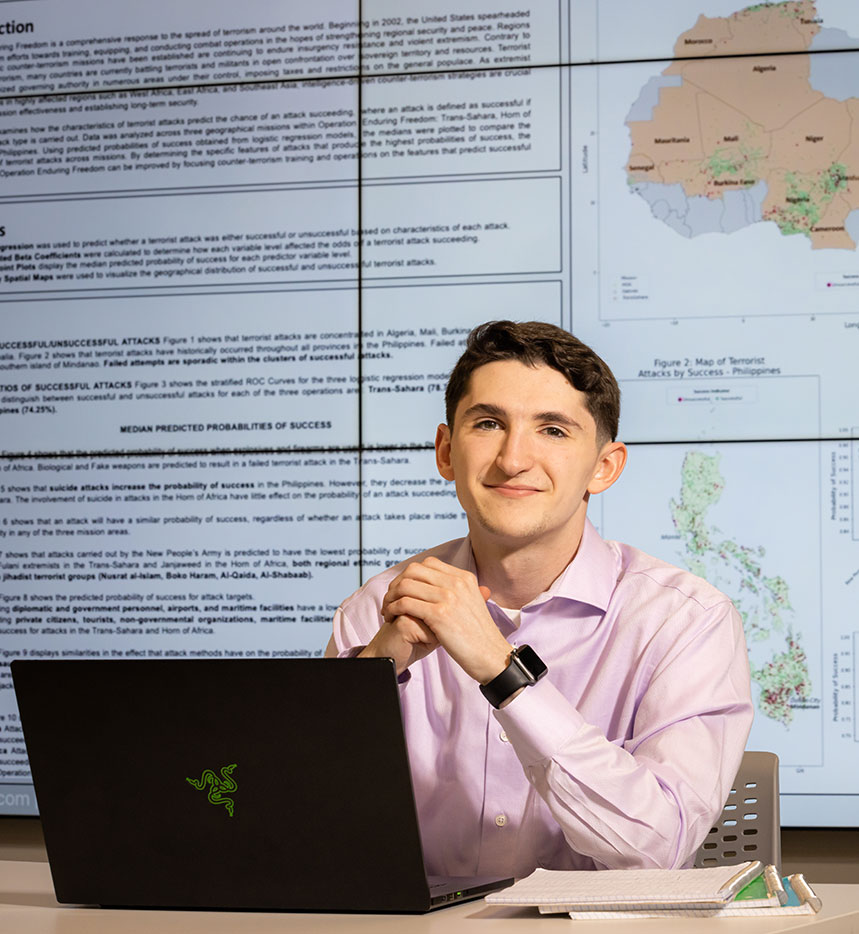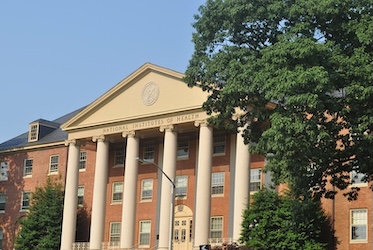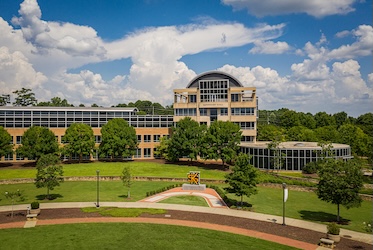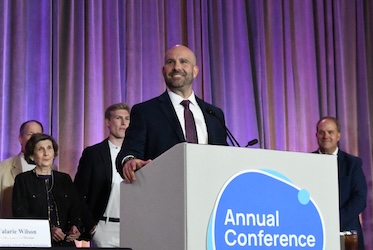

KENNESAW, Ga. | Jul 12, 2023
Throughout his journey at Kennesaw State University, Dalton Shaver found a unique passion that combines his interest in international affairs with his skills in math modeling.
From an internship with the Air Force, to undergraduate research on Operation Enduring Freedom, Shaver readied himself for a career in the defense industry that he started this month after graduating in May.
“Growing up, I was always interested in the military,” said Shaver, whose grandfather and great-grandfather served in the Air Force. In high school, he realized the military had a need for civilian workers in a wide range of jobs.

Shaver decided to attend Kennesaw State due to its proximity to his family and after a positive experience as a full-time student in the dual enrollment program his senior year of high school.
“I immediately fell in love with international affairs after taking a global issues class,” Shaver said. “However, I’ve always been interested in numbers and evidence. You can make claims when talking about national security, but where’s the data? What do the numbers say?”
Those questions led Shaver to the data science minor, offered in Kennesaw State’s School of Data Science and Analytics. He then switched his major to mathematics with minors in international affairs and data science.
“That was probably one of the best decisions I’ve ever made, because I love what I’ve been researching,” he said.
In his final year before graduation, Shaver worked with senior lecturer in the School of Data Science and Analytics Susan Mathews Hardy on research that has led to multiple impressive awards and invitations to present his research around the country. He examined how characteristics of terrorist attacks predict the chance of an attack succeeding across three geographic missions within Operation Enduring Freedom: Trans-Sahara, Horn of Africa, and the Philippines.
“Due to my previous classes on international affairs, I knew a lot about Operation Enduring Freedom in a qualitative sense, but wanted to sift through the data,” Shaver said. “I had previously researched Afghanistan with professor Steve Morris, so I wanted to expand my reserve and look at these other regions.”
When analyzing the available data on these attacks, Shaver’s goal was to present his findings in a way that military organizations, like the Department of Defense, would benefit from them, while also keeping civilians in mind. For example, an organization like the State Department could benefit from Shaver’s findings when issuing travel advisories for tourists.
Ultimately, his research examined how characteristics of terrorist attacks in those regions can predict the chance of an attack succeeding, and determining where counterterrorism training and operations can improve. One conclusion he found was that attacks targeting private citizens, tourists, nongovernmental organizations, businesses, and food or water supply have the largest probability of success for the Trans-Sahara and Horn of Africa regions, while suicide attacks in the Philippines raise the chance of success. He also analyzed major cities within these regions and found attacks have a similar probability of success regardless of whether they happen inside a major city or on the outskirts.
“One of the most unique aspects of Dalton’s research process was meeting with active members of the military,” said Hardy, who helped Shaver make those connections. “He wanted to make sure this research would be relevant for defense operations, and who better to speak with than those with experience fighting for our country.”
Shaver met virtually with alumnus Lt. Col. Trent Geisler, who received his Ph.D. from Kennesaw State in 2022 and currently teaches at the United States Military Academy West Point, and current KSU student Frankarlo Figueroa, who is in the U.S. Army and taking online classes while stationed overseas.
“I’m grateful they took the time to meet with me to discuss my research because both had great ideas,” Shaver said. “Dr. Geisler helped me see past this research and look at the bigger picture, and Frankarlo was able to provide insight about his current experience overseas and knew a lot about guerilla warfare. Even though he’s currently stationed in Europe, he had information about several different regions and helped me narrow my research focus.”
Shaver presented his research on Operation Enduring Freedom at the Fall 2022 Analytics Day, hosted by the School of Data Science and Analytics, and at the Fall 2022 C-Day, hosted by the College of Computing and Software Engineering. He won second place in the undergraduate division at both events. Hardy then helped Shaver apply to a few of the premier undergraduate research conferences around the United States. In early 2023, he was accepted to present at the National Conference on Undergraduate Research (NCUR) and the National Collegiate Research Conference (NCRC) hosted by Harvard University.
“It was an honor to represent Kennesaw State at those conferences and share my research,” Shaver said. “I never would’ve had those opportunities if it wasn’t for my professors who encouraged me to think out of the box.”
Shaver says he felt prepared to enter a job in the defense industry upon graduation, thanks to his courses and internship at Robins Air Force Base, though he’s also interested in getting a graduate degree in a few years.
“My journey at KSU perhaps was not the most conventional, but I ended up really liking the path I took,” Shaver said. “Switching my major was a great decision and led me to faculty members, like Professor Hardy, who have mentored me and helped me figure out what I want to do in the future.”
– By Abbey O’Brien Barrows
Photos by Judith Pishnery
This article was originally published in the Spring issue Kennesaw State University Magazine.

Alumnus builds career in biomedical research at the National Institutes of Health

Kennesaw State president, alumni, and donors named to Atlanta 500 list

Kennesaw State University Alumni Association announces 40 Owls Under 40 Class of 2026

Kennesaw State alumnus nominated for National Superintendent of the Year honor
A leader in innovative teaching and learning, Kennesaw State University offers undergraduate, graduate, and doctoral degrees to its more than 51,000 students. Kennesaw State is a member of the University System of Georgia with 11 academic colleges. The university's vibrant campus culture, diverse population, strong global ties, and entrepreneurial spirit draw students from throughout the country and the world. Kennesaw State is a Carnegie-designated doctoral research institution (R2), placing it among an elite group of only 8 percent of U.S. colleges and universities with an R1 or R2 status. For more information, visit kennesaw.edu.